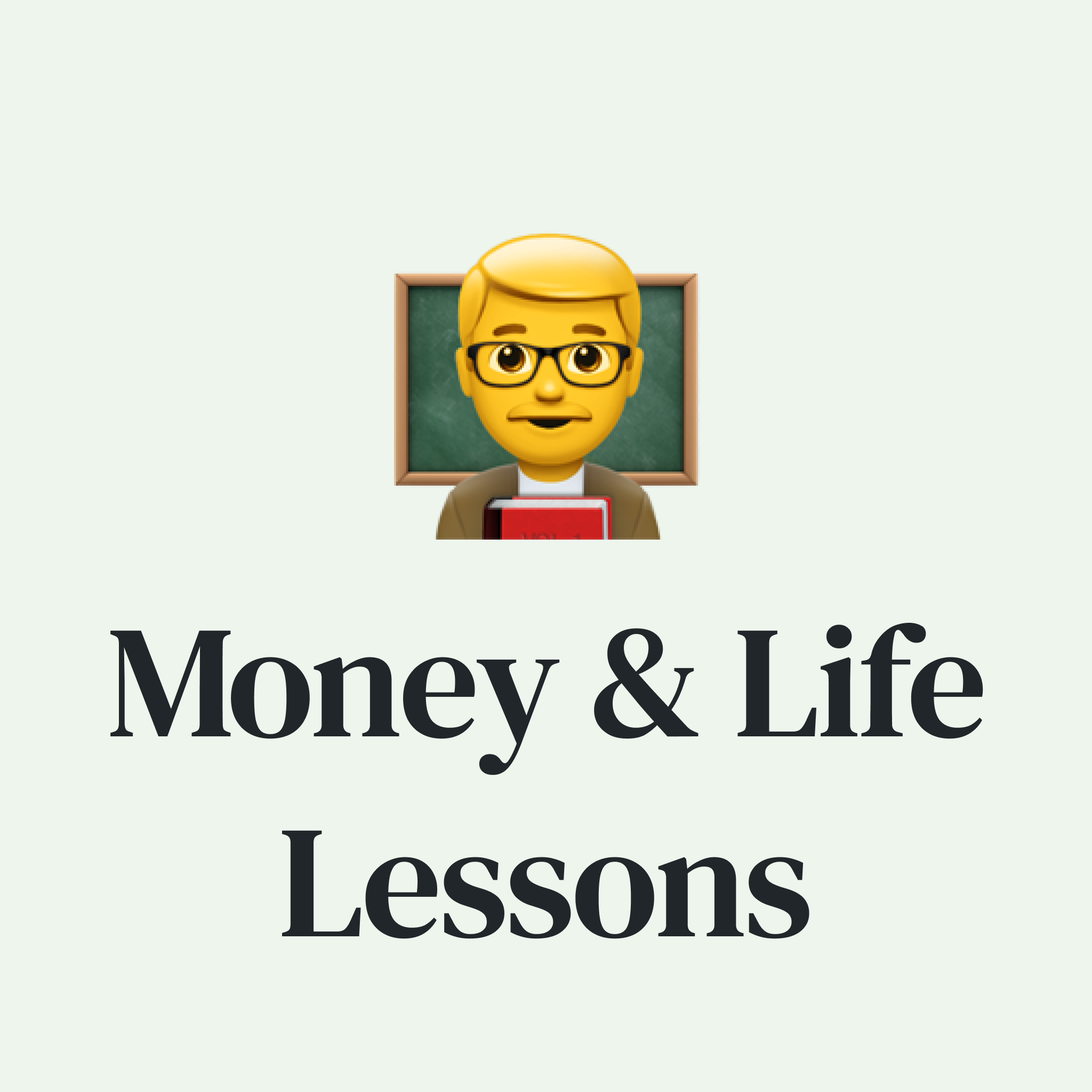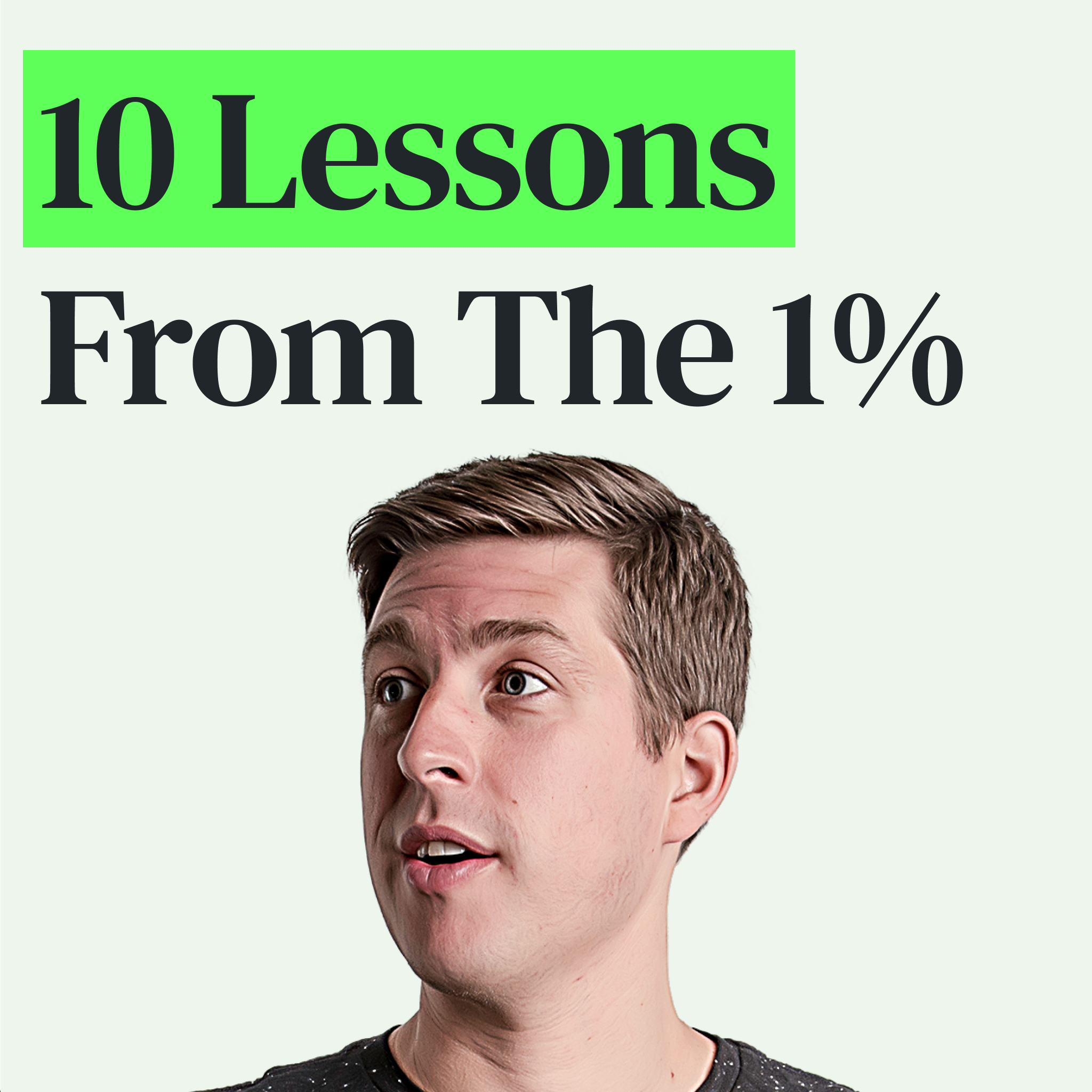🤔 10 Life-Changing Lessons: Money and Life

I recently attended a retreat for high-net-worth investors hosted by Long Angle, a private community for investors with more than $2.2 million in assets.
Instead of talking markets or tax strategies, the weekend revolved around how to align your time, money, and values to live a truly rich life. So I invited the co-founder, Tad Fallows, to join me on Ep #253 to recap what we learned.
Here's a summary of the ten biggest takeaways from the retreat and how they’ve changed the way I think about wealth, success, and what it really means to live well.
💪 1. Treat Your Health Like an Asset
We talk endlessly about compounding wealth, but your health compounds too, and without it, nothing else matters. The idea of “healthspan” versus “lifespan” came up again and again. It’s not just about living longer; it’s about staying healthy enough to actually enjoy those extra years. The more you invest in your body now, the greater the dividends later.
Pro Tips
- Get proactive with testing: Track biomarkers like ApoB, LP(a), fasting glucose, and inflammation markers to understand your true baseline.
- Ask better questions: Try asking your doctor, “If I were willing to spend a little more, what extra tests or screenings would you recommend?”
- Don’t rely only on insurance: Scans like a coronary calcium or DEXA scan might not be covered but can reveal life-changing insights.
- Stay informed: Especially in women’s health, since only about 1% of medical research funding goes there. Learn about menopause, hormone therapy, and new preventive care tools.
❤️ 2. Relationships Are Your Highest-Return Investment
One theme that came up again and again: it’s hard to make real friends as an adult. Between work, kids, and screens, relationships slip down the priority list even though they’re the single strongest predictor of long-term happiness. The retreat made it clear that genuine connection is one of the most valuable things money can’t buy.
Pro Tips
- Build consistency, not intensity: Friendship compounds through regular contact like monthly dinners, game nights, or group workouts.
- Find built-in structure: Community activities, sports, or shared hobbies make it easier to stay connected.
- Don’t confuse time for selfishness: Investing in friendships often makes you a better partner, parent, and friend.
- Include family intentionally: Kids remember moments, not things, so choose experiences over stuff.
✈️ 3. Be Intentional About Travel
Before booking your next trip, ask yourself why you’re going. Are you chasing rest, reconnection, or discovery? Most of us default to the checklist trip with top attractions, hot restaurants, and perfect photos, but the most rewarding travel happens when you slow down and focus on what you truly want out of the experience.
Pro Tips
- Set a clear goal: Decide whether you want rest, adventure, or connection, and plan around that.
- Slow down: Repeat destinations often deliver deeper experiences than whirlwind itineraries.
- Match your trip to your season of life: With young kids, shorter getaways might beat long international ones.
- Travel to deepen relationships: Shared experiences with family or friends often create the best memories.
👨👩👧👦 4. Parent Like a Lighthouse
“Lighthouse parenting” was one of my favorite ideas from the retreat. You’re not steering your kids’ ship; instead, you’re the steady light that helps them navigate safely. It’s about being visible, supportive, and reliable without trying to control every turn of the wheel.
Pro Tips
- Let kids struggle safely: Resist jumping in too soon; confidence grows through challenge.
- Hand off responsibility gradually: Let them manage an allowance, chore, or project to build ownership.
- Redefine success: Good parenting isn’t preventing failure, it’s preparing kids to handle it.
- Give yourself grace: There’s no perfect approach; mistakes are part of both your and their growth.
🌍 5. Relearn How to Dream Big
Kids believe anything is possible, but somewhere along the way, adults stop imagining freely and start settling for “realistic.” Imagination fuels innovation and fulfillment. Reconnecting with that childlike mindset can completely change how you approach the future.
Pro Tips:
- Check your balance: Rate areas like health, family, purpose, and fun by importance and satisfaction.
- Close the gaps: Focus on what’s most important but least satisfying; that’s where growth lives.
- Forget practicality (at first): Big dreams pull you forward before plans exist.
- Start small: One tiny step toward a bold idea can spark real momentum.
🎯 6. Redefine What “Success” Means
At some point, more money stops being motivating. Many people at the retreat were shifting their focus from achievement to impact, using their time and skills to mentor, give back, and build things that matter. True success isn’t about having more, it’s about contributing in ways that create meaning for you and value for others.
Pro Tips
- Audit your motivation: Is your work meaningful or just familiar?
- Use your skills for impact: Apply your business instincts to causes or projects that matter.
- Test before you pivot: Try short-term experiments before fully committing to a new path.
- Find fulfillment in contribution: Helping others often brings the satisfaction money can’t.
⚙️ 7. Simplify Before You Optimize
It’s easy to overcomplicate things in the pursuit of optimization. The discussions around estate planning were a great reminder that clarity beats complexity every time. A simple structure you understand is far better than an elaborate one you can’t explain. Whether it’s your finances, schedule, or systems, start with purpose before adding more layers.
Pro Tips
- Start with intention: Define your “why” before you build systems.
- Revisit old plans: Family needs, laws, and values change, and your plan should too.
- Clarity beats complexity: A simple plan you fully understand always wins.
- Apply everywhere: The same rule goes for investing, taxes, or even productivity tools.
⚠️ 8. Manage Risk, Don’t Try to Eliminate It
You can’t remove all risk from life, but you can manage it intelligently. The key is protecting yourself from what could truly derail you rather than minor setbacks. Over-insuring, over-hedging, and over-optimizing often create more stress than security. Focus on identifying what really matters and building guardrails around that.
Pro Tips
- Set realistic deductibles: Don’t overpay to cover tiny risks you can afford.
- Avoid small claims: They can raise premiums or jeopardize coverage.
- Check insurance before buying property: Wildfire, flood, and wind zones can make homes uninsurable.
- Accept smart risks: Focus on removing catastrophic downsides, not all risk entirely.
💼 9. Diversify Beyond What Feels Safe
Most people are more concentrated than they think. The S&P 500 is nearly half tech stocks, and if you also work in tech, your income and investments are moving in the same direction. True diversification isn’t just about spreading money across funds, it’s about balancing your life across different opportunities, markets, and time horizons.
Pro Tips
- Audit your exposure: Consider your industry, geography, and asset types.
- Think globally: International diversification can balance risk and open new opportunities.
- Add alternatives: Real estate, private markets, or even small business investments can stabilize returns.
- Balance returns and liquidity: Not every asset has to be instantly accessible if it serves a long-term goal.
🌿 10. Optimize Less, Live More
For those of us who love optimization, it’s easy to spend endless time tweaking systems and chasing marginal gains. But at some point, more optimization doesn’t mean more happiness. The best return on effort often comes from shifting your focus toward the things that truly move the needle: health, relationships, and time well spent.
Pro Tips
- Know when enough is enough: Focus on what actually improves your day-to-day life.
- Use time as your true metric: Measure success by how much of it you spend doing things you love.
- Check your motivation: Are you optimizing out of curiosity or fear of missing out?
- Redirect that energy: Channel it into health, relationships, or experiences that actually matter.
💡 The Real Measure of Wealth
By the end of the retreat, one message was clear: true wealth is the alignment of your time, money, and values. If you opened your calendar right now, would it reflect what you say matters most? You can always earn more money, but you can’t earn back time. Take an hour this week to rebalance your portfolio of life. Call a friend, move your body, and do something that fills you up.
Editor’s Note: The content on this page is accurate as of the posting date; however, some of our partner offers may have expired. Opinions expressed here are the author's alone, not those of any bank, credit card issuer, hotel, airline, or other entity. This content has not been reviewed, approved or otherwise endorsed by any of the entities included within the post.








